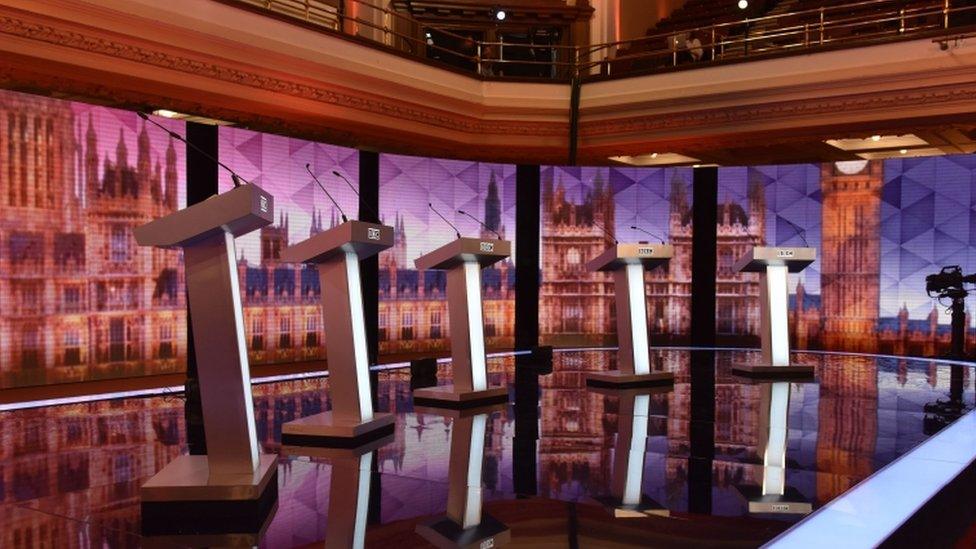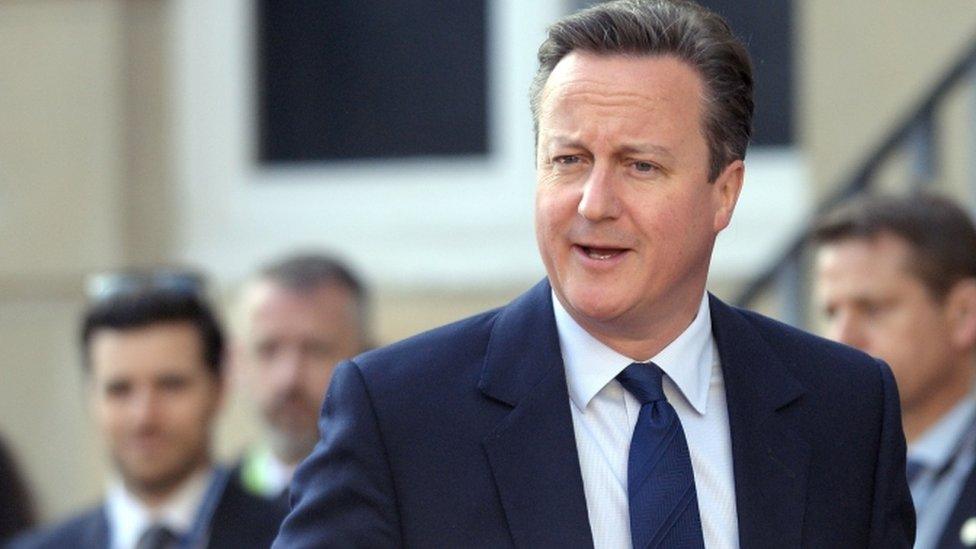Vote Leave anger at ITV over Farage EU debate choice
- Published
Ian Watson reports: "Vote Leave are determined to dislodge Nigel Farage, and are threatening legal action against ITV"
Vote Leave is considering legal action after ITV decided to put Nigel Farage up against David Cameron in an EU referendum TV special.
The official Leave campaign had wanted one of its senior figures - Michael Gove or Boris Johnson - to take part and claimed No 10 had "set the rules".
ITV rejected claims of a "stitch up", while Mr Farage, UKIP leader, said Vote Leave should "put their egos aside".
Downing Street says the PM will not debate against other senior Tories.
A spokesman said this was because the EU referendum, on 23 June, was about much more than "who's up and who's down in the Conservative Party".
Live televised debates featured in the 2010 general election, with the three contenders for prime minister - David Cameron, Gordon Brown and Nick Clegg - taking part.
That format was not repeated at the 2015 general election. But after protracted discussions between Downing Street and the broadcasters Mr Cameron took part in one with seven party leaders but no head-to-head with Labour's Ed Miliband.
'Set the rules'
In the run up to the in-out referendum on Britain's EU membership, ITV plans to hold two TV specials, including an hour-long live programme in which Mr Cameron and Mr Farage will appear one after the other to separately answer questions from a studio audience.
Vote Leave is the official campaign for those wanting the UK to leave the EU - a status it was given by the Electoral Commission after it saw off a challenge from the Nigel Farage-backed Grassroots Out.
Its best known campaign figures are senior Conservatives such as Boris Johnson, Mr Gove and others like Iain Duncan Smith - and the thrust of its campaign seeks to be broader than the more immigration-focused UKIP approach.
Vote Leave's head of media, Robert Oxley, told BBC Radio 4's Today that while Mr Farage had done a "tremendous amount" in the referendum he was not the best person to win over undecided voters.
But Mr Farage disagreed, telling the BBC he could better appeal to voters in the Midlands and the north of England than Mr Johnson who he said was more suited to the "home counties".
Criticising the decision not to include one of its senior figures, a Vote Leave spokesman said ITV had allowed the prime minister "to dictate his own opponent".
"The government has set all the rules for the referendum to give itself every possible advantage. It has also demanded of the broadcasters that the prime minister should not have to debate representatives from the official Leave campaign," the spokesman added.

Analysis, BBC political correspondent Chris Mason
This row matters because it highlights once again the central dispute amongst those wanting the UK to leave the European Union: is Nigel Farage an asset or a liability to their cause?
Vote Leave think he will put off those who are yet to decide who to support - and so are livid that the UKIP leader will appear on the same ITV programme as the prime minister at the beginning of next month.
They wanted Boris Johnson or Michael Gove to appear instead.
But it's long been thought Downing Street would be reluctant for David Cameron to be seen to be so publicly at odds with cabinet colleagues.

In other comments a Vote Leave source on Wednesday accused ITV of having "lied to us in private while secretly stitching up a deal with Cameron".
The source said ITV had "effectively joined the official In campaign and there will be consequences for its future", saying "the people in No 10 won't be there for long".
And a Vote Leave spokesman said on Thursday: "We are discussing legal possibilities to increase the chances that the public will hear the issues properly discussed before they make such an important vote on the future of their democratic rights."
Responding to the criticism, ITV said in a statement that it had "not lied to anyone, nor has there been any kind of 'stitch up'".
A spokeswoman said Vote Leave had been invited to take part in a separate two-hour programme on 9 June and would have "every opportunity" to air its view.

What TV debates are planned, and when?

BBC:
A live event at Wembley Arena on 21 June with representatives of both sides of the EU debate questioned by voters. David Dimbleby, Mishal Husain and Emily Maitlis to present.
A young voters' show from Glasgow on 19 May - presented by Victoria Derbyshire
A special edition of Question Time on 15 June, moderated by David Dimbleby, which the BBC said would feature "one senior advocate from each side"
ITV
David Cameron and Nigel Farage will in turn answer questions from a studio audience in a live programme on 7 June
Live TV referendum debate between figures from both sides of the campaign on 9 June. Line-up yet to be announced
Sky
Two live shows planned featuring David Cameron on 2 June and Leave campaigner and Justice Secretary Michael Gove on 3 June
Each show will include a face-to-face live interview and a question-and-answer session in front of a studio audience
Channel 4
Debate on 22 June, the day before the referendum, featuring "politicians, opinion formers and other high profile pro and anti-protagonists"

The ITV statement added: "It was our editorial decision as to who would take part in the 7 June programme; the PM called the referendum, and the country wants to hear from him, and Nigel Farage has been a leading proponent of an exit from the EU for more than 20 years and his party received 3.8m votes at the election. We invited them both and they accepted.
"We think our viewers will find both programmes useful in providing information ahead of polling day. Our programming will, as always, be fair, balanced and duly impartial."
Meanwhile, Mr Farage accused Vote Leave "apparatchiks" of trying to block him from appearing on the TV debate and said they were "more interested in their careers" in the Conservative Party after the referendum.
"I have consistently tried to bring our side together. They have consistently tried to marginalise UKIP and divide us. They need to put their egos to one side," he told the BBC.
In an appeal for "unity", he said he would work with anybody, within reason, to secure a vote to leave on 23 June.

David Cameron has ruled out debating against other Conservatives in the referendum campaign
Mr Farage also accused the BBC of barring him from its planned TV debates, which include a live event at Wembley Arena on 21 June.
Number 10 says David Cameron will not debate against senior Conservatives who back EU exit, saying it does not want the TV debates turned into a "blue on blue fight".
"This is a major national debate and it should not be reduced to a narrow argument within the Conservative Party.
"We don't want it to become an issue of who's up and who's down in the Conservative party or seen just through the prism of the Conservative party," a source said.